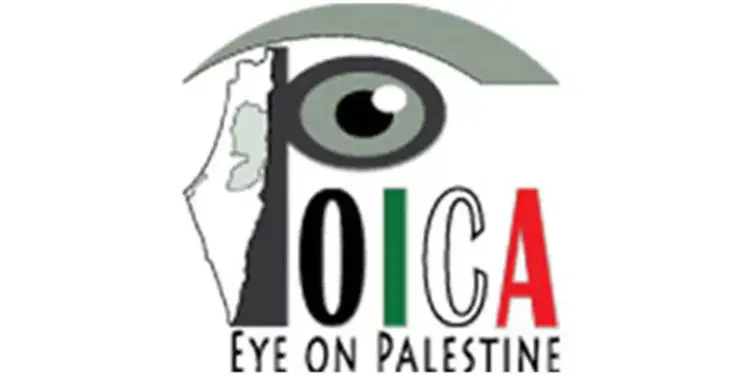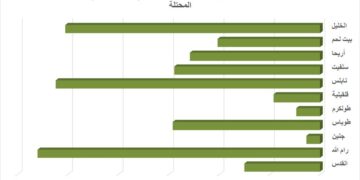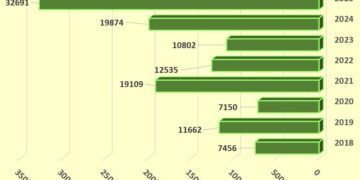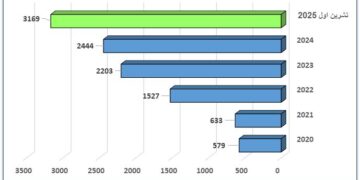Definitions
- Apartheid: Refers to the implementation and maintenance of a system of legalized racial segregation in which one racial group is deprived of political and civil rights.[1]
- COGAT: Coordination of Government Activities in the Territories.
- Green ID: The form of ID held by Palestinians in the Occupied West Bank and Gaza Strip.
- Blue ID: The form of ID held by Palestinians who live in Occupied East Jerusalem.
Introduction
On February 20, 2022, the Israeli government published a ninety page plan entitled “Procedure for Entry and Residence of Foreigners in the Judea and Samaria Area.” The plan, set to be implemented on October 20, 2022, encompasses heavy restrictions on any visitor, volunteer, professional, or spouse hoping to stay in the West Bank, permanently or for a short period of time. Ultimately, these rules further isolate Palestinians from the ability to move, love, study, and visit freely.
The ninety pages of this plan serve as a powerful addition to an already intricate and restrictive permit regime.[2] The newest Israeli entry procedures to the West Bank, though, make two things clear. The first is that the human and civil rights of Palestinians to marriage, privacy, academia, nationality and equality are being impinged upon. The second is that there is a blatant separation between the realization of the rights of Palestinians and the realization of the rights of Israelis living within the same areas. This is apartheid.
The Premise of Apartheid
The title of the new Israeli order, “Procedures for entry and residence of foreigners in the Judea and Samaria area” implies that the procedures apply to a specific geographical region. While there is no official Israeli map denoting borders of the area that the government refers to as “Judea and Samaria,” it should be assumed that these procedures apply to anyone living east of the green line drawn after the war of 1948, ommitting East Jerusalem.[3] This is, however, not the case. There are over 450,000 Israeli citizens living in settlements spread across the area east of the 1948 green line.[4] In the recently published entry procedures document, however, a resident of the Judea and Samaria area is defined as “A Palestinian listed as a resident of the Judea and Samaria area in the Palestinian Population Register.”[5] A more truthful title of this document would be, “Procedures for foreigners wishing to visit or live amongst Palestinians.” By defining residents of Judea and Samaria as Palestinians only and negating the fact that there are Israeli citizens in the area as well, this procedure document serves as a formal segregation of the Palestinians living in the West Bank from their Israeli counterparts. Within the definition of apartheid, there are two pillars: segregation and the deprivation of such segregated group of their rights. This segregation of procedures for Palestinians and Israelis living in the same area fulfills the first pillar, and the second pillar is fulfilled with Israel’s new ninety page document which impinges upon Palestinians’ rights to marriage, privacy, nationality and equality.
The right to Love
Article Sixteen of the United Nations Universal Declaration of Human Rights states that, “Men and women of full age, without any limitation due to race, nationality or religion, have the right to marry and to found a family.”[6] The Israeli entry procedures, however, clearly deter any relationship between a West Bank Palestinian and a foreigner. If there is a romantic relationship between a foreigner and a Palestinian, the foreigner is now required to disclose this information when applying for a visa.[7] The procedures make it clear that, rather than help the case for a visa, a relationship will make the process more difficult. For example, Israel participates in a visa exemption program with a number of countries that allows people from those countries to apply for their visa once they have already arrived at the border. The visa exemption program, however, cannot apply if a foreigner is in a relationship with a Palestinian.[8]
Even when a foreigner is permitted a visa on the premise of being in a relationship, the duration of the visa can be as short as a COGAT official sees fit, and the best case scenario of visa permittance is still far shorter term than what could sustain a marriage. Under the new procedures of entry, there is no route to permanent residence for a foreigner that is married to a Palestinian in the West Bank. In the best case scenario, a spouse may be given a visa for a maximum of one year, and the visa may be renewed for a maximum of 27 months. After 27 months, the spouse must go abroad to apply again.[9] In essence, any marriage between a foreigner and a Palestinian in the West Bank will result in significant time apart and an inability to settle down as a couple and as a family. Furthermore, a relationship with a foreigner will prevent freedom of movement while under a visa; if the foreign spouse leaves the area, the visa is annulled.[10]
Many Palestinians in the West Bank have already experienced the hardships of Israel’s policies towards Palestinian relationships with foreigners. One such couple has been married and residing in the West Bank for over thirty years. After a visit to the US this past April, the wife, originally from the U.S., was deported at the Ben Gurion Airport. When she asked why, the border patrol officer answered, “It is because you are married to a Palestinian.”[11] When she applied again with COGAT to return to the West Bank for her son’s wedding, she learned a month later that she would need to deposit a bond of 70,000 shekels ($19,500). This is an accepted practice for any type of visa into the West Bank. COGAT officers are permitted to request a guaranty deposit of anywhere from 25,000-70,000 shekels.[12] The family asked around and pulled together the 70,000 shekels it took for her to make it to her son’s wedding, and she eventually made it back into the place she had called home for thirty years. This return was not without waiting for several hours at the Jordan border crossing after being initially denied and then given entry a day later than she was told. Now, she is savoring time in her home with her family before her three month visa expires and she is deported again.[13] It has become a crime to be married to a Palestinian, and this woman will be serving her punishment with separation from her family.
Restrictions on Palestinians’ right to love are not new, and they are not just bound to relationships with foreigners. Palestinians are also restricted from loving Palestinians that live as close as ten kilometers away. One young Palestinian, for example, has particularly felt the effects of Israel’s intolerance towards love. Her father is a Jerusalemite and her mother is from Bethlehem. Her parents fell in love when they were young, and they had three children. IDs and passports are given according to a father’s status, so this young woman was given a blue ID when she was born. Three years later, however, for a reason that has still not been disclosed, the young Palestinian’s ID was revoked. When she was 15, she applied for her first permit to travel abroad to Switzerland with her high school choir. To her great surprise, the Israeli Ministry of Interior told her that her number was no longer in the system. Since then, she has lived a life without an ID. In Palestine, IDs are needed for education, healthcare, movement, driving, and more. They are an intricate way of controlling life. Without an ID, this young woman has been unable to leave the country, and she has faced great uncertainty in her education, healthcare, and habitation. She has been in court cases against the Ministry of Interior for ten years, and there are no indicators that the case will be resolved in the near future. As she puts it, “I don’t like my story to be political. My problem is not political. My parents just love each other, and now I am stuck in all of these laws.” Love should not be political, but Israel has created structures that put laws over the freedom to choose who one loves, and this young Palestinian has been punished for it.[14]
The right to a nationality
Article 15 of the UN Universal Declaration of Human Rights states that, “Everyone has the right to a nationality.” and article 13 states, “Everyone has the right to leave any country, including his own, and to return to his country.”[15] Currently, more than two million Palestinian refugees live in Jordan. In addition to this number, many Palestinian refugees live outside of Jordan, but still hold a Jordanian passport.[16] The connections between Palestinians in Jordan and Palestinians in the West Bank are intricate, with familial bonds, business collaborations, cultural traditions, and decades of geographical memories all playing a role. Israel’s new entry procedure, however, barrs any person holding a Jordanian passport from even applying for any form of visa for entrance into the West Bank.[17]
With one document, over two million Palestinians can no longer step foot in the space that holds their cultural, familial, and national being. In addition, the document serves to isolate Palestinians living in the West Bank from family members, business partners, and deep social ties that reside in Jordan.
While Palestinians living abroad without green IDs or Jordanian passports are not automatically barred from entry in the same manner, their ability to visit their home country is still in jeopardy. For these people, applying for a visa to see their family and homeland could mean needing to pull together as much as 70,000 shekels[18] or being turned away at the Jordan border after putting forth the money and effort to travel overseas.[19] This summer, multitudes of Palestinians living abroad have rushed to the West Bank to visit family, finish up businesses, or give over power of attorney out of fears that their future visa applications could be denied.[20] These procedures will cut off millions of Palestinians from their geographical country and from their deeply rooted nationality.
The right to privacy
Article 12 of the UN Universal Declaration of Human Rights states that “No one shall be subjected to arbitrary interference with his privacy, family, home or correspondence…”[21] Every foreigner applying for entrance, however, must include the names, ID numbers, and passports of all first degree relatives living in the West Bank.[22] This information provides the Israeli government with a detailed web of Palestinian familial relations within the West Bank and abroad. The family information serves to add to an already flourishing surveillance regime which includes facial recognition of a growing number of Palestinians.[23] The information given about first degree relatives fuels a database for a smartphone app called “Blue Wolf” which provides profiles that contain photographs, family history, educational background, and security ratings of every Palestinian living in the West Bank.[24] There are thousands of Palestinians that live abroad and visit the West Bank to see relatives every year. With the new entry procedures, these Palestinians must weigh the decision of risking their family’s security and privacy in order to visit home.
The Right to Equality
Article one of the UN Universal Declaration of Human Rights states that “All human beings are born free and equal in dignity and rights.” Israel’s new entry procedures for the West Bank, however, manifest inequality between Palestinians and Israelis through the intense isolation of Palestinians. This kind of isolation of entire people groups diminishes dignity in two ways. Firstly, isolation eliminates international witness to the conditions of such people groups. Secondly, isolation stifles such a group’s ability to develop in a globalized world. These two effects create a vicious cycle where a group’s state diminishes due to isolation, and there is no one to witness this diminishment, due to the isolation.
- Isolation of NGOs
On January 31, 2019, the Israeli government discontinued the Temporary International Presence in Hebron’s (TIPH) mandate to work in the West Bank.[25] TIPH was created both to be a witnessing third party presence to the violations to Palestinian security in Hebron and to encourage, promote, or execute projects for the betterment of Hebron.[26] By the volition of the Israeli government, all of this work has ceased to exist, and the third party presence in Hebron is gone. Similarly, in August of this year, the Israeli government shut down seven Palestinian NGOs, specializing in varying aspects of development, advocacy, and peace.[27] It is clear that on both the local and international level, Israel is working to degrade the Palestinian NGO sector. The new West Bank entry procedures serve to continue this crackdown on NGOs by targeting the capacity of NGOs to work with the international community in the West Bank.
With the new entry procedures, any international volunteer who wishes to live and work in the West Bank cannot be present for more than a year. If a volunteer wishes to continue with their work, the volunteer must return home for an entire year before applying for a visa again.[28] This policy serves to bar any kind of long term relationships between volunteers and NGOs in the West Bank. It also barrs students without green IDs, considered as volunteers by the policy, from doing in depth research in the area. Largely blocking the long term influence of relationships with volunteers and student researchers from abroad cripples, if not terminates, the work of any international NGO in the West Bank as well as further isolating local NGOs from the ability to work with international communities. Not only does this confiscate a large portion of international witnesses in the area, but it also curbs attempts by NGOs at development and peace.
- Isolation of Palestinian Universities
Education is an influential pillar for the success of any society. For Palestinian society in particular, education is deeply engrained in everyday life. On average, Palestinians are the highest educated population group in the Arab world.[29] Academia has the potential to be a space where real strides toward peace could be possible. For the over 214,000 university students in Palestine, however, it is becoming increasingly difficult to have these kinds of groundbreaking, peacemaking interactions. The new entry procedures, for example, will severely upend the international presence of professors and students for interactions and learning in Palestinian Universities.
It should be noted, Israel’s attempt to restrict Palestinian Universities is not new. In 1980, Israeli military order 854 attempted to give the Israeli military ultimate control over licensure, syllabi, student admittance, and the hiring of instructors. Under this military order, any international professor was forced to sign a statement denying affiliation with any organization “hostile” to Israel. With many refusing to sign under principle, Israel began the deportation of international professors throughout Palestine.[30] Palestinian Universities, the Israeli Hebrew University, and the United States Secretary of State denounced these actions, and four months later the military order was suspended. This suspension, however, was not without consequence. The Israeli government showcased its intentions to discourage and control international presence in Palestinian Universities.
The new entry procedure does just this. It creates barriers for any professor from outside of the West Bank wishing to teach at a Palestinian university. Applying and renewing an academic visa will be a complicated process, and there is a lack of clarity around the exact ways in which the procedures will apply for applications to enter.[31] A professor or student may receive a permit for a one year period and may renew such permit for no longer than 27 months. Within these 27 months, however, the professor or student will not be allowed to leave the West Bank without having the visa revoked. For an 18 year old student or a professor with a family and kids, this would mean leaving home for more than two years without being able to return for visits. After 27 months, the international professor or student must go back overseas in order to apply again.[32] If a professor’s cumulative residence exceeds five years, the professor must leave the area for at least nine months before applying for another visa. Effectively, these policies discourage any professor or student not holding a Green ID from long term investment in academia at colleges and universities in the West Bank.
By isolating Palestinians from connections abroad in academia and in the NGO sector while Israelis enjoy the fruits of such connections, this procedure chips away at the dignity and equality of Palestinian society.
Conclusion
From both Jim Crow laws in the United States and the Apartheid regime in South Africa, it is known that the segregation and isolation of a group of people based on race leads directly to grim human rights violations. The recent ninety page plan put forth by the Israeli government for permission to reside with Palestinians in the West Bank shows a clear effort to isolate Palestinians. This plan not only serves to further segregate Palestinians from their Israeli counterparts, but also to cut off Palestinians from connections abroad by creating barriers to marriage, academia, the NGO sector, nationalism, business, and family. This is apartheid, and the world should take note.
References
- Al-Qadi, Nasser. The Israeli Permit Regime: Realities and Challenges, ARIJ: Bethlehem, 2018. https://www.arij.org/publications/special-reports/special-reports-2018/the-israeli-permit-regime-realities-and-challenges-this/.
- Anadolu Agency. “Israeli Army Storms, Shuts Down 7 Palestinian NGOs in Occupied West Bank,” A News Middle East, August 18, 2022. https://www.anews.com.tr/middle-east/2022/08/18/israeli-army-storms-shuts-down-7-palestinian-ngos-in-occupied-west-bank.
- COGAT. Procedure for Entry and Residence of Foreigners in the Judea and Samaria Area, Operations Department, September 4, 2020. https://www.gov.il/BlobFolder/policy/judeaentry2022/en/Procedure%20for%20entry%20and%20residence%20of%20foreigners%20in%20the%20Judea%20and%20Samaria%20area.pdf.
- El-Galil, Tarek Abd. “Israeli Restrictions that Hurt Palestinian Universities Draw International Rebukes,” Al-Fanar Media, May 9, 2022. https://www.al-fanarmedia.org/2022/05/israeli-restrictions-that-hurt-palestinian-universities/.
- Fanack.com. “Education in Palestine,” Fanack.com, February 9, 2011. https://fanack.com/palestine/education-in-palestine/.
- France 24. “Emigre Palestinians Hurry Back Home to Visit Fearful of New Israeli Rules,” France 24, March 3, 2022. https://www.france24.com/en/live-news/20220903-emigre-palestinians-hurry-back-to-visit-fearful-of-new-israeli-rules.
- Hass, Amira. “This American Woman’s Crime: She Married a Palestinian. Now She Must Pay,” Haaretz, June 11, 2019. https://www.haaretz.com/opinion/2019-06-11/ty-article/.premium/shes-an-american-citizen-but-israel-says-she-cant-return-home-to-bethlehem/0000017f-e78e-df2c-a1ff-ffdfc84d0000?v=1662713465247.
- Hempel, Jonathan. “The Watchful Eye of Israel’s Surveillance Empire,” +972 Magazine, May 3, 2022. https://www.972mag.com/israel-surveillance-facial-recognition/.
- OCHA. “Israel Terminates TIPH Operations in H2: Further Shrinking of Humanitarian Space Leaves Residents Facing Increased Protection Risks.” The Monthly Humanitarian Bulletin, March 18, 2019. https://www.ochaopt.org/content/israel-terminates-tiph-operations-h2-further-shrinking-humanitarian-space-leaves-residents#ftn1.
- Shtaya, Mona. “Nowhere to Hide: The Impact of Israel’s Digital Surveillance Regime on the Palestinians,” MEI, April 27, 2022. https://www.mei.edu/publications/nowhere-hide-impact-israels-digital-surveillance-regime-palestinians.
- Sullivan, Anthony T. “Palestinian Universities in the West Bank and Gaza,” Center for Middle Eastern and North African Studies, Vol LXXXIV, no. 1-2, January-April 1994, 175. https://deepblue.lib.umich.edu/bitstream/handle/2027.42/73777/j.1478-1913.1994.tb03596.x.pdf?sequence=1.
- TIPH. “Mandate and Tasks,” WayBackMachine, June 21, 2021. https://web.archive.org/web/20190121035004/http:/www.tiph.org/mandate-and-agreements/.
- United Nations. Universal Declaration of Human Rights, General Assembly, Resolution 217A (December 10, 1948)), https://www.un.org/en/about-us/universal-declaration-of-human-rights.
- UNRWA. “Where We Work: Jordan,” 2022. https://www.unrwa.org/where-we-work/jordan#:~:text=More%20than%202%20million%20registered,refugee%20camps%20throughout%20the%20country.
- Wex Definitions Teams. “Apartheid,” Legal Information Institute, 2022. https://www.law.cornell.edu/wex/apartheid#:~:text=Apartheid%20refers%20to%20the%20implementation,of%20the%20International%20Criminal%20Court.
- Young Palestinian Woman. Personal Interview. Conducted by ARIJ, September 21, 2022.
- [1]Wex Definitions Teams, “Apartheid,” (Legal Information Institute, 2022), https://www.law.cornell.edu/wex/apartheid#:~:text=Apartheid%20refers%20to%20the%20implementation,of%20the%20International%20Criminal%20Court.
- [2]Nasser Al-Qadi, “The Israeli Permit Regime: Realities and Challenges,” (The Applied Research Institute of Jerusalem, 2018), https://www.arij.org/publications/special-reports/special-reports-2018/the-israeli-permit-regime-realities-and-challenges-this/.
- [3] The Israeli military issued an order in 1967 that the term ‘Judea and Samaria region’ shall be identical in meaning for all purposes to the term ‘the West Bank Region.’
- [4]PeaceNow, “West Bank Population,” (PeaceNow (2022)), https://peacenow.org.il/en/settlements-watch/settlements-data/population.
- [5]COGAT, Procedure for Entry and Residence of Foreigners in the Judea and Samaria Area, (Operations Department, September 4, 2020), 5, https://www.gov.il/BlobFolder/policy/judeaentry2022/en/Procedure%20for%20entry%20and%20residence%20of%20foreigners%20in%20the%20Judea%20and%20Samaria%20area.pdf.
- [6]United Nations, Universal Declaration of Human Rights, (General Assembly, Resolution 217A (December 10, 1948)), https://www.un.org/en/about-us/universal-declaration-of-human-rights.
- [7]COGAT, “Procedure for Entry and Residence of Foreigners in the Judea and Samaria Area,” (Operations Department, September 4, 2020), 29.
- [8] COGAT, “Procedure for Entry and Residence of Foreigners in the Judea and Samaria Area,” (Operations Department, September 4, 2020), 28.
- [9]COGAT, “Procedure for Entry and Residence of Foreigners in the Judea and Samaria Area,” (Operations Department, September 4, 2020), 69.
- [10]COGAT, “Procedure for Entry and Residence of Foreigners in the Judea and Samaria Area,” (Operations Department, September 4, 2020), 15.
- [11]Amira Hass, “This American Woman’s Crime: She Married a Palestinian. Now She Must Pay,” (Haaretz, June 11, 2019), https://www.haaretz.com/opinion/2019-06-11/ty-article/.premium/shes-an-american-citizen-but-israel-says-she-cant-return-home-to-bethlehem/0000017f-e78e-df2c-a1ff-ffdfc84d0000?v=1662713465247.
- [12]COGAT, “Procedure for Entry and Residence of Foreigners in the Judea and Samaria Area,” (Operations Department, September 4, 2020), 9-10.
- [13]Amira Hass, “This American Woman’s Crime: She Married a Palestinian. Now She Must Pay,” (Haaretz, June 11, 2019),
- [14]Young Palestinian Woman, Personal Interview (conducted by ARIJ, September 21, 2022).[15]United Nations, “Universal Declaration of Human Rights,” (General Assembly, Resolution 217A (December 10, 1948)), https://www.un.org/en/about-us/universal-declaration-of-human-rights.
- [16]UNRWA, “Where We Work: Jordan,” (2022), https://www.unrwa.org/where-we-work/jordan#:~:text=More%20than%202%20million%20registered,refugee%20camps%20throughout%20the%20country.
- [17]COGAT, “Procedure for Entry and Residence of Foreigners in the Judea and Samaria Area,” (Operations Department (September 4, 2020)), 18.
- [18]COGAT, “Procedure for Entry and Residence of Foreigners in the Judea and Samaria Area,” (Operations Department (September 4, 2020)), 9-10.
- [19]COGAT, “Procedure for Entry and Residence of Foreigners in the Judea and Samaria Area,” (Operations Department (September 4, 2020)), 7.
- [20]France 24, “Emigre Palestinians Hurry Back Home to Visit Fearful of New Israeli Rules,” (France 24 (March 3, 2022), https://www.france24.com/en/live-news/20220903-emigre-palestinians-hurry-back-to-visit-fearful-of-new-israeli-rules.
- [21]United Nations, “Universal Declaration of Human Rights,” (General Assembly, Resolution 217A (December 10, 1948)), https://www.un.org/en/about-us/universal-declaration-of-human-rights.
- [22]COGAT, “Procedure for Entry and Residence of Foreigners in the Judea and Samaria Area,” (Operations Department, (September 4, 2020)), 77.
- [23]Jonathan Hempel, “The Watchful Eye of Israel’s Surveillance Empire,” (+972 Magazine (May 3, 2022)), https://www.972mag.com/israel-surveillance-facial-recognition/.
- [24]Mona Shtaya, “Nowhere to Hide: The Impact of Israel’s Digital Surveillance Regime on the Palestinians,” (MEI (April 27, 2022)), https://www.mei.edu/publications/nowhere-hide-impact-israels-digital-surveillance-regime-palestinians.
- [25]OCHA, “Israel Terminates TIPH Operations in H2: Further Shrinking of Humanitarian Space Leaves Residents Facing Increased Protection Risks,” (The Monthly Humanitarian Bulletin (March 18, 2019)), https://www.ochaopt.org/content/israel-terminates-tiph-operations-h2-further-shrinking-humanitarian-space-leaves-residents#ftn1.
- [26]TIPH, “Mandate and Tasks,” (WayBackMachine (June 21, 2021)), https://web.archive.org/web/20190121035004/http:/www.tiph.org/mandate-and-agreements/.
- [27]Anadolu Agency, “Israeli Army Storms, Shuts Down 7 Palestinian NGOs in Occupied West Bank,” (A News Middle East (August 18, 2022)), https://www.anews.com.tr/middle-east/2022/08/18/israeli-army-storms-shuts-down-7-palestinian-ngos-in-occupied-west-bank.
- [28]COGAT, “Procedure for Entry and Residence of Foreigners in the Judea and Samaria Area,” (Operations Department (September 4, 2020)), 41.
- [29]Fanack.com, “Education in Palestine,” (Fanack.com (February 9, 2011)), https://fanack.com/palestine/education-in-palestine/.
- [30]Antony T. Sullivan, “Palestinian Universities in the West Bank and Gaza,” (Center for Middle Eastern and North African Studies, Vol LXXXIV, no. 1-2 (January-April 1994)), 175, https://deepblue.lib.umich.edu/bitstream/handle/2027.42/73777/j.1478-1913.1994.tb03596.x.pdf?sequence=1.
- [31]Tarek Abd El-Galil, “Israeli Restrictions that Hurt Palestinian Universities Draw International Rebukes,” (Al-Fanar Media (May 9, 2022)), https://www.al-fanarmedia.org/2022/05/israeli-restrictions-that-hurt-palestinian-universities/.
- [32] COGAT, “Procedure for Entry and Residence of Foreigners in the Judea and Samaria Area,” (Operations Department (September 4, 2020)), 7 & 31.
Prepared by:
The Applied Research Institute – Jerusalem














